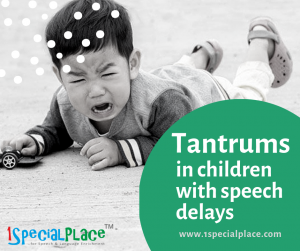Tantrums in Children with Speech Delays
Tantrums in Children with Speech Delays
Tantrums in Children with Speech Delays, “Every child is gifted, they just unwrap their packages at different ages! ”
 A speech and language delay can sometimes affect a child’s overall development because they can’t process what you are saying to them. But let’s first understand what speech and language mean? Language is a child’s ability to understand the purpose of words and to understand what is said. Speech is their ability to use their mouth, tongue, lips, and jaw to form the sounds of words and make those sounds intelligible to other people.” Now imagine not being able to tell someone what you want and not being able to get it for yourself, either.
A speech and language delay can sometimes affect a child’s overall development because they can’t process what you are saying to them. But let’s first understand what speech and language mean? Language is a child’s ability to understand the purpose of words and to understand what is said. Speech is their ability to use their mouth, tongue, lips, and jaw to form the sounds of words and make those sounds intelligible to other people.” Now imagine not being able to tell someone what you want and not being able to get it for yourself, either.
Imagine being in pain but not being able to say what hurts so someone can help you to feel better.
Tantrums in Children with Speech Delays
Imagine feeling scared or angry or sad and not being able to talk through your worries with the people you love. Imagine being hungry or thirsty but not being able to ask for food or drink. This might lead to Frustration in you as an adult; but it leads to Temper Tantrums in children.
Here are some ideas on dealing with anxiety with kids.
Temper tantrums range from whining and crying to screaming, kicking, hitting, and breath holding. They’re equally common in boys and girls and usually happen between the ages of 1 to 3. Some kids may have tantrums often, and others have them rarely. Tantrums are a normal part of child development. They’re how young children show that they’re upset or frustrated.
Tantrums may happen when kids are tired, hungry, or uncomfortable. They can have a meltdown because they can’t get something (like a toy or a parent) to do what they want. Learning to deal with frustration is a skill that children gain over time.
Tantrums are common during the second year of life, when language skills are starting to develop. Because toddlers can’t yet say what they want, feel, or need, a frustrating experience may cause a tantrum. As language skills improve, tantrums tend to decrease.
Social Anxiety and how to deal with it.
Toddlers want independence and control over their environment — more than they can actually handle. This can lead to power struggles as a child thinks “I can do it myself” or “I want it, give it to me.” When kids discover that they can’t do it and can’t have everything they want, they may have a tantrum.
This temper tantrum can be not only be mind blogging for the child but also be very frustrating for the parent. As a parent you can reach out to the team of Speech Language Pathologist and Psychologist for the solution if-
- The tantrums cause a lot of bad feelings between you and your child.
- You have questions about what you’re doing or what your child is doing.
- The tantrums become more frequent, intense, or last longer.
- Your child often hurts himself/herself or others.
- You often feel angry or out of control when you respond to tantrums.
- You keep giving in.
Many studies suggest that “language skills may help children verbalize rather than use emotions to convey needs and use their imaginations to occupy themselves while enduring a frustrating wait.” This means parents of children in toddler and preschool years can provide language-rich environments and help build their children’s vocabulary through play, book reading and by talking aloud (label the emotions you see and hear from your child) to help develop healthy emotional habits.
Self Control activities for your child.
During pretend play, parents can model emotions (“Mr. Bear is feeling sad because he lost his blanket”) and help act out healthy and positive solutions to the problem (“Maybe he should ask his mommy to help him find it”). If you’re not sure how to set up pretend play situations or find it hard get to started, try consulting your speech language pathologist nearby or reach out to us online for stimulating activities that can spark language-rich experiences thus reducing temper tantrums!!
Behaviour management tips by psychologists.
Feel free to drop comments below and subscribe to us for tips and ideas for a speech and language rich environment for your child.
For more ideas check out our other blogs
- How To Talk To A Newborn Baby - April 1, 2022
- Tips for Children with Hearing Loss - July 4, 2020
- Tips For Teaching AAC to a Child - June 17, 2020




Leave a Comment
(0 Comments)